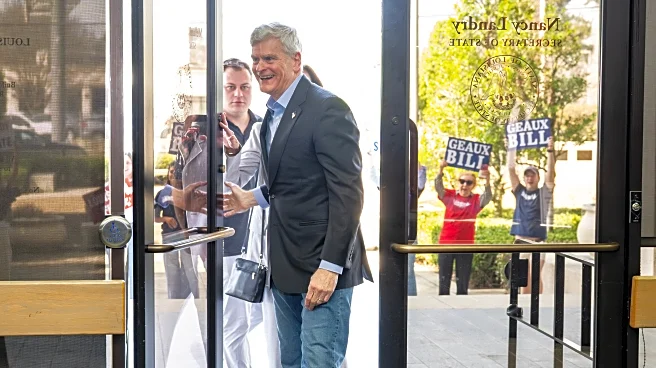Rapid Read • 8 min read
The Trump administration, led by Agriculture Secretary Brooke Rollins, has announced a new policy restricting the placement of solar panels and wind turbines on U.S. farmland. This decision is part of a broader effort to reduce tax-funded green energy projects, particularly those involving solar panels manufactured by foreign adversaries. Rollins emphasized that productive farmland should not be used for green energy projects subsidized by initiatives like the Inflation Reduction Act. The administration's stance reflects concerns over national security risks associated with Chinese-produced solar panels, which have been under scrutiny for potentially containing rogue communication devices. This move aligns with President Trump's broader energy policy, which has favored traditional energy sources such as oil and coal over renewable energy.
AD
The restriction on green energy projects on farmland has significant implications for the U.S. energy sector and environmental policy. By limiting the use of renewable energy sources, the Trump administration is prioritizing traditional energy industries, which could lead to increased fossil fuel production and consumption. This decision may benefit oil and gas companies, which have been major supporters of Trump's political campaigns. However, it could hinder efforts to combat climate change and reduce greenhouse gas emissions, as renewable energy projects are crucial for transitioning to a more sustainable energy system. The policy also raises concerns about national security, given the focus on foreign-manufactured solar panels.
The Trump administration is likely to continue its focus on expanding traditional energy sources, including signing more oil leases and opening new coal mines. This approach may face opposition from environmental groups and policymakers advocating for renewable energy and climate action. The administration's energy policies could also lead to legal challenges or pushback from states that prioritize green energy initiatives. Additionally, the removal of regulations by the EPA may further facilitate the expansion of fossil fuel industries, impacting environmental standards and public health.
The decision to restrict green energy projects on farmland highlights broader geopolitical tensions, particularly with China. Concerns over national security and foreign influence in the U.S. energy sector may influence future policy decisions. The administration's stance also reflects a cultural and political divide over climate change and energy policy, with potential long-term impacts on the U.S.'s role in global climate initiatives. The emphasis on traditional energy sources may affect the country's ability to meet international climate commitments and transition to a sustainable energy future.
AD
More Stories You Might Enjoy













